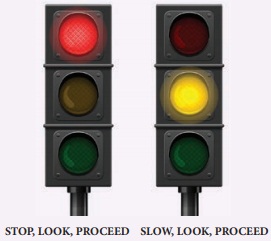Road Safety Rules and Regulations | Chapter 5 | Civics | 8th Social Science - Traffic Signs and Signals | 8th Social Science : Civics : Chapter 5 : Road Safety Rules and Regulations
Chapter: 8th Social Science : Civics : Chapter 5 : Road Safety Rules and Regulations
Traffic Signs and Signals
Traffic Signs
Traffic signs are there to regulate
traffic, warn about hazards and to guide the road users. Understanding traffic
signs is essential. We should have a proper knowledge of traffic signs. The
government has made it mandatory for a person who wants to obtain driving
license to be well versed with the traffic signs. Traffic signs prevent the
undesirable risks posed on the road to drivers and passengers in the vehicle. There
are three types of traffic signs.
Mandatory Signs – give order and need to be followed strictly. They are generally in circular in shape.
Cautionary Signs – warn the user regarding road situation ahead. They are generally, in triangular shape.
Informatory signs – give information regarding directions, destinations, etc., They are generally in rectangular
shape.
Traffic Signals
Traffic lights is a signalling
device that is positioned at a road intersection, pedestrian crossing to
indicate when it is safe to drive, ride or walk using a universal colour code.
Red –
this signal indicates to stop behind the
stop line.
Amber (Yellow) – this signal indicates stop. Do not pass through or start until green shows. If, by mistake, you
are caught in yellow signal in the middle of a large road crossing, continue
with care and do not accelerate in panic.
Green –
this signal indicates you may go if the way
is clear.
Steady Green Arrow Signal – this signal may be
provided in addition to the full green signal. This indicates to proceed with
caution in the direction the arrow points.
Flashing Red Signal - it means to come to
complete stop. Proceed only when the way is clear.
Flashing Yellow Signal – it indicates to slow
down and proceed with caution.
Lights at Night:

At night, when traffic
has dwindled, the traffic police might switch off the signals in many
intersections which means proceed with caution but no need to stop.
Related Topics